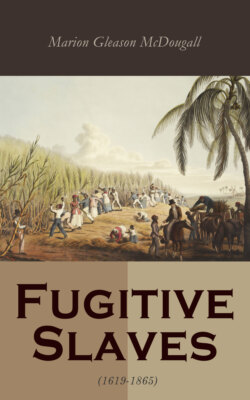Читать книгу Fugitive Slaves (1619-1865) - Marion Gleason McDougall - Страница 7
На сайте Литреса книга снята с продажи.
Intercolonial Cases.
Оглавление§ 9. Intercolonial cases.—When, as was often the case, no agreement upon the return of fugitives had been arranged between the colonies, the rendition of a slave depended wholly upon the state of feeling existing between the two peoples, and sometimes became an important question. Between the New England colonies no cases have been found recorded, although we infer that there must have been reason for the insertion of a fugitive slave clause in the Articles of Confederation of 1643.33
Of other early cases one of the most interesting is the escape from Virginia of four Englishmen belonging to the class of bound servants. They rowed in a small boat up the coast as far as Cape May, where they landed.34 They soon found themselves objects of suspicion with the people, and, as was a common practice, took refuge among the Indians. About a year afterward their masters tracked them to their place of refuge, and captured two of them, but the others were again beyond reach. The Indians, who evidently did not always befriend runaways, had just sold one of them, William Browne, to a Swede, and Browne, learning of his former master's appearance, had found opportunity to escape. The fourth of the fugitives was still among the Mantas, and could not be secured. Of the two recaptured, one was returned without trouble, but the other, Turc, who had just entered the service of a certain Pieter Aldrich, resisted his captors. A struggle took place upon the boat in which they were carrying him away. After wounding three of his guards, he succeeded in making his escape, only to be recaptured almost immediately. When tried for the deed at New Amsterdam, he received a death sentence.35 In this case, one of the most complete in detail left to us, may be found, in the incidents of escape, pursuit, resistance, and final rendition, all the features of the later fugitive slave cases. It is also an example wherein the laws of the period, which required the rendition of a bound white man in the same manner as a negro slave, were strictly carried out: and in the diverse fates of the four men we find instances probably typical of the fortunes of most fugitives of the time.
§ 10. International relations.—The proximity of the French, Spanish, and Dutch settlements led to escapes from the colonies of one power into those of another. All were slaveholding communities, and there was no disposition to shield a slave because his lot was a hard one; but the distrust and enmity between neighboring colonies owing allegiance to different sovereigns caused such escapes to lead to petty quarrels. There was no system of extradition treaties; in fact, there was as yet little international law. Fugitives were demanded as an act of comity, and sometimes their delivery was refused. It was hardly a subject on which the home governments bestirred themselves. The colonies were left to make their own agreements, or to settle their own disagreements.
